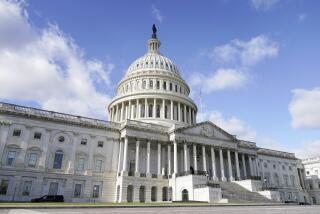Congress returns for session’s last lag
WASHINGTON — The ousted Republican-led Congress returns to the Capitol this week to try one last time to shorten a long legislative to-do list, while the just-elected members will vote for new leaders in races that could signal the direction the parties will take next year.
The lame-duck session mixes a dispirited Republican Party and a Democratic Party that knows it will soon have the upper hand in both chambers — a potentially combustible cocktail.
At minimum, Congress must pass a temporary spending bill to keep the government running until the next Congress takes office. Getting much else accomplished could be difficult.
“Democrats won’t allow anything to pass they don’t like, and Republicans have little interest in starting the Democratic reign early,” said Thomas Mann, a congressional scholar at the centrist Brookings Institution think tank in Washington. “It could be a very short lame-duck session.”
As the old Congress wraps up, the freshman lawmakers will arrive. They won’t be sworn in until January, but they will meet with President Bush, pick up IDs, and learn such fine points as the proper chamber attire and the location of the members-only gym. And they will help choose leaders.
Two House races — one Democratic and one Republican — could reveal a lot about how the parties will position themselves in the next session.
Current Minority Leader Nancy Pelosi (D-San Francisco) is poised to become the first female speaker. The choice for House majority leader, the No. 2 slot, is between current Minority Whip Steny H. Hoyer (D-Md.), a moderate, and Rep. John P. Murtha (D-Pa.), whose call for U.S. withdrawal from Iraq made him a favorite of party liberals.
Hoyer’s supporters, including some of the new centrist Democrats, point to his tireless efforts to get them elected — he visited 80 districts and raised more than $8 million. Murtha’s backers say the former Marine’s stance on the war was a significant factor in the Democratic victory.
On Sunday, Pelosi endorsed Murtha, long an ally, praising him “for all you have done for Democrats.”
“Your leadership gave so many Americans, including respected military leaders, the encouragement to voice their own disapproval at a failed policy,” she said in a letter to Murtha, citing his call for troop withdrawals.
Hoyer issued a statement saying he respected Pelosi’s decision, “as the two are very close,” but said the majority of the caucus supported him.
On the Republican side, three men are battling to be the next House minority leader: current Majority Leader John A. Boehner of Ohio, whom some may want to blame for the party’s loss of the majority, and conservative Reps. Mike Pence of Indiana and Joe L. Barton of Texas. (Current Speaker J. Dennis Hastert of Illinois is not seeking a leadership position.)
The first order of business for the lame-duck Congress, though, is to ensure that the government has money to function. In the current Senate, Minority Leader Harry Reid (D-Nev.) has told Majority Leader Bill Frist (R-Tenn.) that Democrats will work with Republicans to clear spending bills for fiscal year 2007 (which began Oct. 1) that have “reasonable funding levels.”
If Congress cannot finish the individual spending bills, lawmakers are likely to approve a “continuing resolution” that would keep the government operating mostly at 2006 levels until the new Congress begins.
The session could also extend some tax breaks that have expired or are due to expire; approve a U.S.-Vietnam trade pact in advance of Bush’s visit to Hanoi on Friday; allow new offshore oil drilling; and pass a nuclear deal with India, a Bush administration priority.
Senate Republican leaders hope to win quick confirmation of Bush’s Defense secretary nominee, former CIA chief Robert M. Gates. Secretary Donald H. Rumsfeld resigned last week.
And the White House wants the Senate to confirm John R. Bolton as United Nations ambassador — his recess appointment expires when this Congress adjourns — but he faces Democratic opposition, and last week a key outgoing Republican on the foreign relations committee, Lincoln Chafee of Rhode Island, said he would not support him.
Another Bush priority also hangs in the balance: legislation that would rewrite domestic wiretap laws to give investigators the power to monitor e-mail and phone communications between suspected terrorists overseas and people in the United States without advance court approval. The House passed such a bill before the election, but the Senate recessed without taking action.
“We hope that the Democrats would see the utility in having this critical tool in the war on terror,” White House Counselor Dan Bartlett told “Fox News Sunday.” Reid told CBS’ “Face the Nation” that “we’ll be happy to take a look at it” but would not say whether action would be taken now.
For Republicans, the session could offer the last chance to insert earmarks, spending provisions for pet projects, into bills. “There may be a little bit of ‘Oh my gosh, if I don’t get it done in the lame duck now since I’m still in the majority, it will never get done,’ ” said G. William Hoagland, Frist’s top budget aide.
A leading opponent of earmarks, Sen. John McCain (R-Ariz.), told NBC’s “Meet the Press” that “elimination of earmarking” should be a high priority. “The system of earmarking is corrupting. There’s sufficient proof of that now to — for anyone’s satisfaction,” he said.
Also this week, Sens. Russell D. Feingold (D-Wis.) and Joe Lieberman of Connecticut are expected to introduce a bill to rescind an Oct. 1, 2007, termination date for a special inspector general’s office that monitors U.S. expenditures on Iraq reconstruction. (Lieberman won reelection as an independent last week after losing the Democratic primary.) The proposal “enjoys broad bipartisan support,” said Jim Manley, a Reid spokesman.
The inspector general has produced a series of reports highlighting waste and fraud in the Iraq rebuilding effort. Language that would shutter the investigative office was quietly included in a military authorization bill, in an apparent effort to prevent further embarrassment for the Pentagon and the administration.
Both parties still hope to hold a separate vote on a bill to extend the research and development tax credit, a college tuition tax break and more than 40 other expiring provisions.
Another measure that could emerge is a bill that would open a large area of the Gulf of Mexico to oil and gas drilling.
Before the election, congressional negotiators were unable to reconcile differences between the Senate bill and a much more expansive House bill that would relax the ban on drilling in most coastal waters, including along the Pacific coast.
But with the GOP majority in its sunset — and the chief proponent of the House bill, resources committee Chairman Richard W. Pombo (R-Tracy), defeated — pro-drilling business groups have urged GOP leaders to pass the more modest Senate bill.
richard.simon@latimes.com
joel.havemann@latimes.com
More to Read
Start your day right
Sign up for Essential California for news, features and recommendations from the L.A. Times and beyond in your inbox six days a week.
You may occasionally receive promotional content from the Los Angeles Times.







